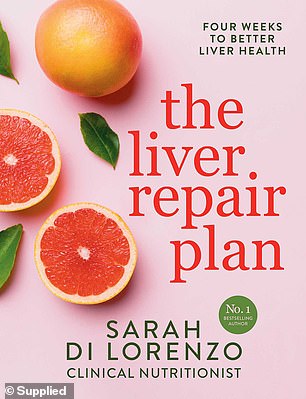When it comes to bits of our bodies we think about regularly, the humble liver doesn’t immediately spring to mind.
Jiggly bum? Yes. Tummy rolls? Tick. But the wedge-shaped piece of us that’s called the ‘silent organ’ doesn’t usually get a look-in.
It’s hardly a surprise. The liver doesn’t have any pain receptors so it goes under the radar for most of the time.
But your liver is also your body’s hardest-working organ. It’s busy, making up about two per cent of an average human’s body weight and holding 13 per cent of your blood supply.
It’s the place in your body where everything is processed – and plays a central role in weight loss, digestion, immunity, blood sugar control, hormone regulation and more.
Clinical nutritionist Sarah Di Lorenzo, author of The Liver Repair Plan, says the liver is ‘critical for our good overall health’.
‘If your liver is not well, then your entire body will know about it,’ she says. ‘When your liver health is poor, it’s a roadblock to reaching your health goals.
‘Think about weight loss – your liver is involved in your metabolism, so if it’s not working properly then your metabolism is impacted.

‘When people improve their liver health, the weight starts falling off, while their skin, energy, mood, libido, stress and sleep improves,’ says Sarah di Lorenzo, author of The Liver Repair Plan
‘When people improve their liver health, the weight starts falling off, while their skin, energy, mood, libido, stress and sleep improves.’
If your liver’s in trouble, you might not even realise it until it’s damaged and inflamed – which is why Di Lorenzo says it’s important to look out for the subtle signs, and there are some you might find surprising.
‘When your liver has damage, it doesn’t produce enough clotting proteins so you may bruise easily,’ Di Lorenzo explains.
‘This is also a sign of progressive liver damage and can be from any type of liver disorder.’
Constant headaches are ‘a common sign of liver dysfunction’ to look out for, adds Di Lorenzo. They can be caused when the liver is compromised and can’t filter toxins from the bloodstream.
Dark circles under your eyes are also a ‘telltale sign’ of impaired liver function. ‘When the liver can’t clear waste, it’s deposited in the vessels under the eyes.’
Struggling to lose weight is a big one that Di Lorenzo has encountered all too often.
‘The liver is one of many roadblocks for people struggling to lose weight,’ she says.

In his 60s, David’s liver was under strain. By following Sarah’s plan, he reduced his biological age by 20 years – and his doctor was astounded
‘When our liver is burdened, it can’t function properly, which impacts how it metabolises nutrients and fat, slowing down our metabolism and leading to weight gain. In a compromised liver, toxins can build up and hormonal imbalances can occur, leading to really stubborn weight gain.’
Of particular concern is excess weight around the midsection, which suggests there is fat between the organs of the abdominal cavity rather than subcutaneous fat, which is fat under the skin.
If you’re suffering from bloating and a pot belly, Di Lorenzo says you could be suffering from a condition called ascites, where the liver malfunction leads to a build-up of fluid – this is when liver disease is very advanced and linked to liver cirrhosis.
Having a tongue with a white coating on it can also indicate liver problems, as can itchy spots on your arms, legs and soles of the feet, which are a surprising sign that something’s amiss.
Importantly, our energy levels are also linked to the liver, so if you’re feeling unusually fatigued it could be a sign to go to your doctor to get your liver checked.
If you do have some of the above symptoms, the good news is that the liver has the greatest regenerative capacity of any organ in the body. Even after 90 per cent of it has been removed, it can regrow to a normal size.
That doesn’t mean it’s invincible – many diseases can destroy it beyond repair – but there are things you can do right now to support its regeneration.
One thing to do is – with guidance from your doctor – look at what supplements and pain relief medications you’re taking.
‘While herbs and supplements may seem harmless because many can be purchased over the counter, some can be toxic to our liver,’ Di Lorenzo explains.
‘Many people are genuinely surprised when I share this information – they wonder how something “natural” could be toxic to the liver – but it’s true.
‘Many people take over-the-counter supplements because they think they’re being healthy, but you should only take what you really need. Ideally, use practitioner-only ranges that are clean and effective.’
Among the herbs and supplements to ‘be careful of’, according to the expert, are aloe vera, bodybuilding supplements, green tea extract, traditional Chinese medicines and weight-loss supplements.
Additionally, Di Lorenzo says pain relief medications should only be taken ‘when you really do need them’.
‘I know many people who take them for the mildest of symptoms. Pain-relief medications like paracetamol and NSAIDs (e.g. ibuprofen) can damage the liver,’ she says.
‘In the developed world, paracetamol is the most common cause of acute liver failure. Ibuprofen is linked to liver damage because it can increase the liver enzyme ALT (alanine aminotransferase), meaning liver cells are damaged or have died.’
Other simple ways to support liver regeneration are to reduce your alcohol consumption and stay hydrated.
Di Lorenzo’s rule of thumb is to drink 30ml of water for each kilo of body weight per day; get regular check-ups with your doctor; aim to get to a healthy weight and stay at it; and eat a healthy and balanced diet.
But what foods are key to achieving the best result?

Sarah Di Lorenzo’s book, The Liver Repair Plan, published by Simon & Schuster is out now
Di Lorenzo advises looking for antioxidant-rich foods that are full of fibre, good fats and polyphenols.
Coffee, coriander, cruciferous vegetables, tea, grapes, blueberries, seeds and nuts all get the tick of approval.
‘The best foods for our liver are those that support comprehensive liver function and detox pathways. While all healthy, real, whole foods support our health, some key foods have a bigger impact so should have starring roles in our diet,’ she says.
Embracing herbs and spices in your diet is a good way to add to the taste without amping up the salt, with Di Lorenzo saying they are ‘amazing at accelerating the nutritional profile of your meals’.
Fibre-rich foods are also important for keeping your bowel functioning, avoiding constipation and keeping cholesterol low.
‘Plus, fibre protects the liver from inflammation,’ says Di Lorenzo.
‘Think of eating a rainbow of fruit and vegetables, high-fibre whole grains, good fats, lean proteins, nuts and seeds, legumes, and calcium-rich dairy foods.’
David’s story
Sydney man David O’ Toole began working with Sarah Di Lorenzo in November 2023 after tests showed his liver was under strain.
After just four weeks of following Di Lorenzo’s recipes, cutting out alcohol and incorporating Pilates into his routine, he saw his liver function return ‘to textbook levels’, something he and his doctor ‘could hardly believe’.
‘Now, in my mid-60s, I feel decades younger, with recent tests confirming that my biological age is in the 40s,’ explains David, who calls his experience ‘life-changing’.
‘I was determined not to follow the path that so many my age take – frequent doctor visits and a growing list of ailments,’ he adds.
‘It is clear to me that our medical system is struggling under the weight of preventable health issues, and I am so grateful to have found a path that allows me to take full responsibility for my health.’
Sarah Di Lorenzo’s book, The Liver Repair Plan, published by Simon & Schuster is out now










